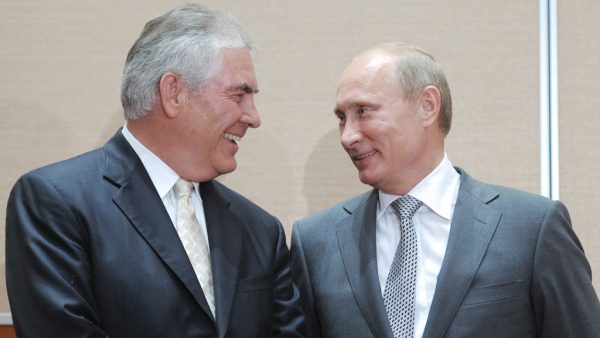By JOSH LEDERMAN

Rex Tillerson’s foreign policy isn’t sounding much like Donald Trump’s.

By JOSH LEDERMAN

Rex Tillerson’s foreign policy isn’t sounding much like Donald Trump’s.
At his confirmation hearing Wednesday, the former Exxon Mobil CEO selected by Trump for secretary of state called Russia a “danger” and vowed to protect America’s European allies. He rejected the idea of an immigration ban on Muslims. He treaded softly on the human rights records of key U.S. partners like Saudi Arabia.
In the words of Sen. Bob Corker, the Senate Foreign Relations Committee’s GOP chairman, Tillerson “demonstrated that he’s very much in the mainstream of foreign policy thinking.” But doing so forced Tillerson to break with several of the president-elect’s most iconoclastic statements on diplomacy and international security.
Again and again, Tillerson hewed more closely to long-standing, bipartisan positions on America’s role in the world, and who are its friends and foes.
A look at where Tillerson’s views didn’t quite match those of his would-be boss:
RUSSIA
Tillerson adopted a tough tone toward Moscow, apparently attempting to rebut the perception that he’s too close to Putin.
The Russian leader previously awarded Tillerson his country’s “Order of Friendship” following Exxon’s deals with Russia’s oil industry. But on Wednesday, Tillerson called Putin’s Russia a threat to the United States.
Whereas Trump as a candidate played down Russia’s 2014 annexation of Crimea from Ukraine, arguing the population there was pro-Russian anyway, Tillerson said the annexation was illegal and amounted to “a taking of territory that was not theirs.”
Whereas Trump’s campaign team last summer softened language in the GOP platform calling for arming Ukraine, Tillerson said he would have recommended providing U.S. and allied defensive weapons, plus aerial surveillance, so the Ukrainians could protect their Russian border.
“The taking of Crimea was an act of force,” Tillerson said. When Russia flexes its muscles, he said the U.S. must mount “a proportional show of force.”
Still, the Kremlin said Thursday the former Cold War foes can overcome their differences once Trump takes office.
Putin’s spokesman, Dmitry Peskov, said he hopes the two presidents will get along and they can normalize ties if they show “mutual respect.”
CAMPAIGN HACKING
Before Wednesday, Trump spent weeks ridiculing the U.S. intelligence agencies’ accusations that Russia hacked and leaked emails, spread “fake news” and took other actions to interfere with the U.S. election.
Tillerson wasted no time in accepting the findings. He even went further than Trump, conceding it’s a “fair assumption” the hacking couldn’t have taken place without Putin’s consent
Not Trump, who has repeatedly praised Putin’s leadership. While he said at a news conference Wednesday that “I think it was Russia,” Trump sidestepped the question of Putin’s responsibility. Instead, he argued, “If Putin likes Donald Trump, guess what, folks? That’s called an asset, not a liability.”
THE MUSLIM BAN
During the campaign, Trump called for a temporary ban on Muslims immigrating to the U.S. The proposal then evolved into halting immigration from countries linked to terrorism. Trump later suggested he was reconsidering the Muslim ban.
“I do not support a blanket type rejection of any particular group of people,” Tillerson said categorically at his hearing. He said the U.S. should “support those Muslim voices” that reject extremism and insisted Americans shouldn’t be scared of Muslims.
RAPISTS AND CRIMINALS
Trump started his presidential bid by taking aim south of the border, accusing Mexico of sending “rapists” and criminals with drugs into the U.S.
Asked about those sentiments, Tillerson said he would “never characterize an entire population with any single term at all.”
Mexico and other Latin American nations are anxious about Trump’s campaign pledges to build a border wall and deport millions of immigrants illegally in the U.S.
Tillerson, by contrast, said he would engage closely with Mexico.
“Mexico is a long-standing neighbor and friend of this country,” he said.
DEFENDING ALLIES
Trump sent chills through much of Europe when he suggested the U.S. might not defend its NATO allies if they came under attack, unless they’d contributed enough to the alliance’s collective defense costs.
He later qualified his comments, while insisting NATO’s future depended on members paying their fair share.
Tillerson offered ironclad support for NATO’s Article 5, which obligates the allies to treat an attack on one as an attack on all. If a NATO member is invaded, the oil man said, the U.S. would join other members in coming to its defense.
“The Article 5 commitment is inviolable, and the U.S. is going to stand behind that commitment,” Tillerson said.
SAUDI ARABIA
Trump used Saudi Arabia’s shoddy human rights record as a campaign cudgel against Hillary Clinton, pointedly asking why she wouldn’t “give back the money” the kingdom gave her family foundation.
Tillerson played it more conservatively with a country at the heart of the American security strategy for the Middle East.
Saudi Arabia doesn’t share American values, he said.
But Tillerson said he needed “greater information” before declaring Saudi Arabia a human rights violator.
It was an answer that wasn’t well received by all the senators present. But it was, to use a turn of phrase, diplomatic.
What can one say?
Leave a Reply
You must be logged in to post a comment.